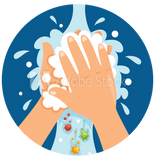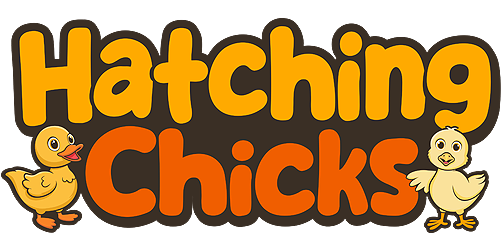Whilst we have never had any reported issues at Hatching Chicks, as with all animals, there is always a slight chance of animal to human transmission of disease and because of this we advise you to ask everyone who handles the chicks not to kiss, nuzzle or hold chicks close to their face and ensure they wash their hands after handling chicks or equipment. We recommend a dispenser of disinfecting hand gel placed near the incubator and brooder box will help ensure compliance with this.

Everyone should wash their hands after handling chicks and ducklings to prevent the spread of any bacteria.
COVID 19
All equipment is washed with warm soapy water with at least 1 week gap between uses from one centre to the next.
Because all our instructions are able to be viewed as videos from our website, we can deliver and pick up from any Centre, School or Home without entering into any buildings. Staff will wear masks during any interactions with clients. You will be emailed a delivery time and link to instruction videos I week prior to your delivery. When delivering we will bring the kits to the front door.
You will be emailed a reminder the day before your pick up is due and requested to leave all equipment outside the front door just prior to your pick up time.
Allergies
There is a possibility that children who have egg allergies, could be affected by participating in the hatching program.
Egg allergy usually occurs when the protein in egg white or the egg yolk are consumed, however as the chicks hatch from their shells there is a membrane between the shell and the chick which dries and flakes into tiny particles called dander. This dander will be in the air around the incubator and also in the chicks fluff and so will be breathed in when observing the chicks. This may cause a reaction. Any child who has a severe allergy to egg is at risk, and should not participate in the program unless it has been firstly discussed with the child’s parents.
Please alert parents of children with egg allergies that you are planning on running a chick hatch program. For parents who may have concerns, it is recommended they discuss the situation with their Doctor/ Specialist before their child participates in the program
As an extra precaution people with egg allergies should wear disposable gloves when handling the chicks and remember hands need to be washed.
Peanut / Fish Meal in livestock feed:-
The chick feed supplied does not contain Peanut or Fish Meal. However, the manufacturers cannot guarantee that some residue from other products in the manufacturing equipment has not contaminated the feed. It is recommend that anyone known to have an allergy to these products should not be allowed to handle the chick feed, food receptacle or the litter (where feed may have been scratched out of the feeder by the chicks).
Roosters
It is against Council Regulations to keep Roosters in residential areas.
Please keep roosters out of schools, daycare centers, and aged care centers.
They are known for crowing early in the morning
They can be highly hostile toward people, especially young children.
If you are keeping a hen for eggs you do not need to have a rooster.
Do not purchase unsexed chicks (from us or anybody else) if you live in a residential area or you cannot have roosters on your rural property.
Any person who purchases unsexed chicks from us needs to complete and return the Adoption Application certifying that they have sufficient property (ie rural) and experience to handle a rooster.

